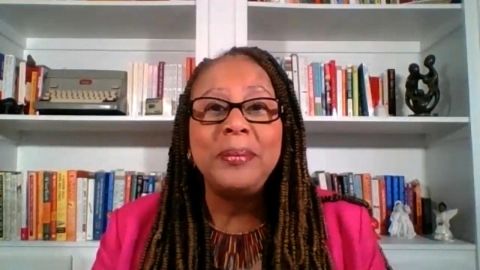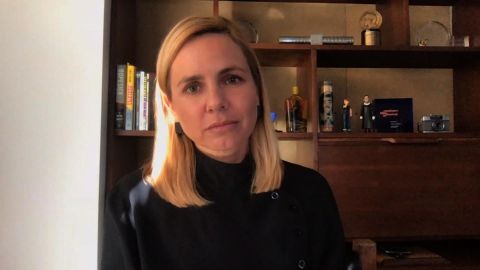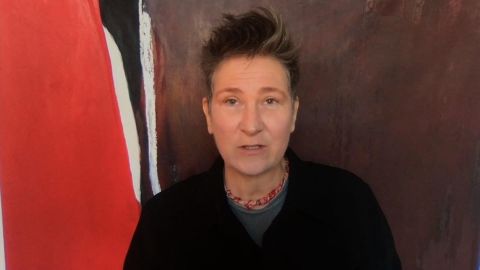Read Transcript EXPAND
CHRISTIANE AMANPOUR: Turning now to someone who is confronting some of the painful misconceptions that people have about race. Michelle Singletary is a personal financial columnist for “The Washington Post.” And in her latest 10-part series, “Sincerely, Michelle,” she gets personal about her own struggles as a black woman. And here she is speaking to our Michel Martin about why she wrote this series and what she hopes readers will take away from it.
MICHEL MARTIN: Thanks, Christiane. Michelle Singletary, thank you so much for joining us.
MICHELLE SINGLETARY, WASHINGTON POST FINANCE COLUMNIST: Oh, I’m so happy to be here.
MARTIN: Michelle, you’re best known as a journalist who writes about personal finance. And I’m going to put the emphasis on personal. I mean, you kind of guide people into the nitty-gritty of how to budget, how to invest, about how to think about money. But this is different. This series is a deep dive into kind of the structural issues that often economists write about or that academics write about. Of course, you do it with your usual kind of flair. But what made you decide to take this route?
SINGLETARY: Well, you know, as I watched the protests for George Floyd and Breonna Taylor and Black Lives Matter, I just felt like it was time to have candid conversation about race and money. So, as you say, my column has always been personal. I talk about my family, and my grandmother, Big Mama, who raised me. But I haven’t told a lot of the stories about my career and the micro-aggressions that I have experienced. And we have been so quiet for so long. And when I say we, meaning a lot of black professionals. These things happen to us, and you just don’t want to talk about it because you don’t want people to accuse of you of being an angry black woman or being too sensitive about race issues. And so you bury it. And, with all the protests, I think, collectively, a lot of people in America, particularly people of color, are finally saying, you know what, I’m tired of tiptoeing around you. You have to understand that racism still exists. The structural racism still here. We are still dealing with slavery. And I real wanted to hone in on that point because we don’t want to talk about slavery. We want to talk about it as if it’s in the past but the repercussions are still with us, and I just wanted to have an in-your-face I am tired of being quiet conversation about what it’s like to be black in America.
MARTIN: So, let’s just go through some of them. Let’s start with the sneakers, the clothes and the shoes, OK, let’s just go right there. You’ve heard a lot of people saying that if black people just stopped spending all their money on fancy cars and clothes and shoes that they would be better off, and you say that’s just a stereotype. Tell me more about that. Why?
SINGLETARY: Yes. It really is. I mean, we say that, and actually even some people in the black community, if we’d just stopping buying the Cadillac. Like nobody buying a Cadillac anymore anyway. But it’s just not true. When you look at the numbers when it comes to net worth. So, we will say that blacks have net worth, significantly less than white Americans and then we just sort of leave it there, and people will fill in the gaps. Oh, it’s because of their spending that they don’t spend well. But when you look at numbers behind them and look at the historical perspective, it’s all about net worth in your home. And so, let’s take a step back from that then. So, then, could we buy homes at the same rates at whites? Were we able to get those application loans when they first came out? No. The government put in place policies that denied blacks the right to buy homes at certain neighborhoods (INAUDIBLE) period. Black veterans coming back from World War II couldn’t take advantage of G.I. Bill. These were structural barrier. And so, our network is directly tied to homeownership which we were denied. So, it’s not because we have, you know, expensive Michael Jordan sneakers. That $200 sneakers is not worth a whole house. It’s more affordable on their level because they want their kids to be like everybody else.
MARTIN: Well, hold on a second through. You point out that — for example, you’re talking about a structural thing. I mean, you point out that nearly 30 percent of white families have received some sort of monetary imperatives from (INAUDIBLE) and that’s compared to 10 percent of black families. And you also point out that black families headed by a college graduate more or less wealth (ph), we’re not talking about income, we’re talking about wealth, than white households headed by somebody who dropped out of high school. How is that possible?
SINGLETARY: That’s right. Workplace discrimination. So, you have — you do what they say. You’re black. You go to college. You get your degree. You’re still not going to earn the same as a similarly educated white person going for that same job.
MARTIN: And why is that? Is it because the social network that are unavailable to white people are advantageous? Is it because the — you know what, is it that the schools that African-Americans tend to attend have less value in the workplace? Why is that?
SINGLETARY: I think it’s all of the above. It’s everything. It’s — they don’t appreciate the school that they go to somehow, that we got there at our schools even if it is an Ivy League simply because that we are black. And so, therefore, we are still not equal to that other Ivy League white people. It is also because, you know, families — the financial legacies. How do they have the financial legacies? Because they own a home. How did they have a home? Because they were allowed to have homes when we weren’t? So, it’s really all of the above. It’s the totality of the discrimination over the years that has put us back financially. And people always say, well, what about the personal responsibility? I’m not ignoring the fact that people need to handle their money better, but we have to also have to understand what has been in place to prevent African-Americans from getting the job. And when they get the job, being paid same at the same rate.
MARTIN: Here’s the thing, Michelle. You don’t ignore personal responsibility in this series. In fact, I found it interesting that you said, that your reporting indicates that black families do tend to spend slightly more on average, on clothing and shoes than the national average. Why is that?
SINGLETARY: Well, I think come from a situation where you haven’t had a lot, you want to display your wealth. It’s just a natural progression when people have, say, new money. But when you dig in the numbers, you see that white families spend more, say, on alcohol. So, it’s not as if it’s totally uneven, it’s just spending on different types of items. And so, for African-Americans you want to look nice. And, in fact, you are encouraged. I know my grandmother when I was first working for “The Baltimore Evening Sun” in my first full-time job, when I would come downstairs to go work, she would actually like look at me and say, OK, that’s not appropriate. Go back upstairs. Put a slip-on. Can you imagine, you know? Because she wanted to make sure that the white colleagues didn’t think that I was less than because of how I was dresses. So, you dress a certain way, you drive a certain car because you want to present yourself as having wealth actually, really because America values wealth and how you look. And so, it’s perfectly understandable that you would spend more on your hair or your clothes to present yourself so that they won’t go, oh, there’s that poor black person. And if they turn it around and make it like it’s an insult that they’re trying to look nice.
MARTIN: You say that policies are institutions that claim to be race neutral actually aren’t. I mean, the analogy that you use, you know, one of your famous analogies, you say that, look, if you purposefully trip somebody, you can’t turn around and say that it’s their fault that they fell, and you say that Americans got to stop tripping black people. And you cite credit scores as an example of that. How is that?
SINGLETARY: So, credit scores were created because they wanted to create a system where it appeared it was race neutral, right. How do you pay your bills? This appears to be race neutral. How much debt do you have? What credit that you have? Appears to be race neutral. However, it is not. So, the algorithm looks at how you pay your bills and whether or not you can get credit, except the laws, segregation, Jim Crow, black quotes, prevented blacks from getting loans. So, that means that their information isn’t in the database. And so, if we aren’t homeowners, and a home loan is a key part of a credit score, then you are not in that algorithm and that means you’re going to have a lower credit score. And so, that — therefore, it’s not race neutral. If we are more likely to rent, our rent payments are not calculated in the credit score. Newer models are taking that into account but a lot of the institutions are using old models that eliminate or don’t include the kinds of ways we pay our bills. And so, you can’t criticize blacks for having lower credit scores when the very things that they need to have a better score was denied by systemic racism.
MARTIN: This series is 10 parts of which (INAUDIBLE) have already run. You talk about black business, you talk about credit scores, as we have said, you talk about redlining and how redlining deprives African-Americans of generational wealth and we just talked about, you know, the spending habit, the habits and so forth. Which of these was the hardest to write?
SINGLETARY: It was the first one on affirmative action. And I’m almost tearing up now thinking about it. When I first worked — went to go work for “The Post,” and you probably can attest to this, Michel, there was a lot of like, well, how did she get here? You know, what’s her background? It was — the questioning wasn’t the normal, oh, what news did you come true? It’s like, you know, I was fairly young. I got to “The Post” fairly quickly after an editor identified me, it was like — it was in five months. And at the time, you know, it took forever to get to “The Post,” you know, and people were just like, well, what is she — how is she here? And so, it got back to me that people were basically saying that I was like “affirmative action hype.” But behind that was I didn’t deserve to be there. I took a job from some white reporter. And I finally asked my editor at the time, David Vides (ph), after one meeting, after hearing this yet again or questioning my background, and I just said, did you hire me because I was black? Because I just was tired of the comments. And he said yes. I hired you because you were black. And at the moment I just felt like this crush of insecurity and that I was an imposter. And he said, now, come into my office, let me tell you more. And then he said, I hired you because you were black. I hired you because you’re a woman. I hired you because you have — came from a low-income background and that gave you a perspective in the financial coverage that we don’t have on the desk. I’ve hired you because you have an expertise at bankruptcy. And he just went to this whole litany of things. And he said, I hired you for the totality of who you are. And then I said, we — I did a podcast and I asked him, this is years later, right — I said, well, why didn’t you say yes right away to my blackness? Why did you say all of that other stuff? He said, because, Michelle, I wanted you to know that your blackness was an asset, that I wanted you to know that, first and foremost, who you were as a black American was just as important as your expertise in bankruptcy. And I didn’t want to run away from that and you shouldn’t run away from that. And as you can see, I’m still emotional because my whole career from the time I was in college to “The Post,” you know, questioning whether I was legitimately there because of being smart or that I earned my place, and he said that. I said, you know, absolutely. I’m here at “The Washington Post” as a black personal finance columnist who learned how to handle money from her black grandmother who never had more than had a high school education but was a master at money management, and all of that was an asset to “The Post.” So, that was the hardest to write because I had to, first of all, just talk about what that was like and, you know, there’s still some of those people who question still me at “The Post” and still whispering. And when I get awards still sort of, well, I don’t know why she got that. And so, it still is happening. So, it was pretty hard to sort of just put it out there, but I had to. I had to say, this is what you are doing to my psyche and other people who come here who are minorities, be it black or woman or whatever, that you are undermining our confidence. I did not take a white person’s job. That was my job. That was my position to have for who I was. So, that was the hardest one to write.
MARTIN: Why do you think it still hurts you so much all these years later with all your success? I mean, you’ve won, you know, countless awards. You’ve written books. I mean, gosh, you have an enormous following. Why do you think it still hurts all these years later?
SINGLETARY: Because the difference is something that I cannot control, that they still think that I’m different because of this, and that hurts at such a deep level. I have no control over the fact that I am black and I love that I’m black and you’re still questioning after all that work, after all those books and it just — I guess I lose hope sometimes that I was hoping that in my lifetime that would change and it still hasn’t, but having written the column and getting feedback from people, I realize that it is opening up people’s eyes to how I feel and how other blacks feel and I think it is changing some minds. And we do have a long way to go, but we have come a long way. So, I think that’s why it still hurts, and I guess some at a deeper level when you still feel like you’re an impostor because of all of that negative feedback that you’ve been given over a lifetime, it’s hard to combat that.
MARTIN: I wonder if part of it is that because you’ve done everything that’s been asked of you by this society. You’ve gotten your education. You’ve gotten married and stayed married. You have raised your children within marriage. I wonder if part of the pain of it is it feels like it will never be enough, like no matter what you do it will never be enough.
SINGLETARY: You hit it right on the nail, absolutely. I did everything. I did not have kids out of wedlock (ph). I went to college. I’ve been married for almost 30 years. My husband and I saved to send all our kids to college debt free. It’s like what more can I do to show and prove to you that I’m worthy, that you don’t have to question my credentials and say things to us as if we are some unicorn. One of the parts of this series that’s coming up, I call it “Five Star,” is that the microaggressions that you continue to have. I was attending a play at a Reno (ph) stage in D.C. and my husband and I are full subscription season holder — ticketholders. We love the theater. And during one of the intermissions of a multi-racial play called “Oklahoma,” “Oklahoma,” it was a multi-racial cast, a white patron behind me tapped me on the shoulder and says, wow, you have great seats. You must know somebody in the cast. There were white people on both sides of me. Then, the cast had black people and white people and Asian, and I just looked and I said, so, you basically — the message she was telling me is that I did not deserve or how could I have possibly paid for these premium seats? Are you kidding me? And I didn’t say anything at the time because my husband always says, just, you know, let it go. Let it the go. And I was just — I can remember it like it was yesterday. I was so incensed. You did not ask the white person to the left of me or to the right of me how they got their tickets. Just because I’m black you asked me how I got my ticket. You can’t imagine that I am a season ticketholder for premium seats at this theater company. So, that’s why it still hurts.
MARTIN: Michelle Singletary, thank you so much for talking with us today.
SINGLETARY: You’re so welcome.
About This Episode EXPAND
Activists Jess Kelly and Hossam Bahgat discuss the imprisonment of activist Karim Ennarah in Egypt. Mariana Van Zeller discusses “Trafficked,” her new series for National Geographic. Washington Post finance columnist Michelle Singletary clarifies misunderstandings people have about the Black community and finance.Finally, John Carlin and k.d. lang reflect on the AIDS crisis.
LEARN MORE



